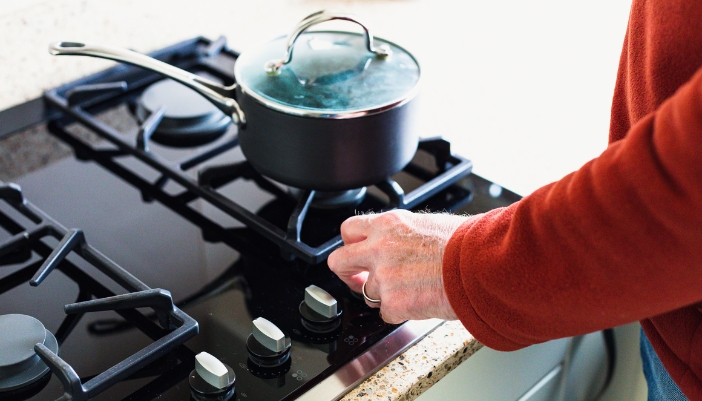Every home chef knows the importance of a reliable cooktop — it's where most of the cooking magic happens! And just like any appliance, sometimes it can have off days, like maybe a burner isn't working as it should. But some problems leave you wondering, should you repair or replace it?
Of course, the answer depends on a few things. However, there's no need to worry — we're here to help you piece things together! Let's go over the signs and solutions of when to repair or replace your cooktop!
Signs Your Cooktop Needs Attention

Before we dive into the decision of repairing or replacing, it's crucial to identify the common cooktop issues you might be facing. Some of these signs include:
- Inconsistent Heating: If your pot of water boils quickly one day and takes forever the next, there might be an underlying issue.
- Burners Not Lighting Up: A functional cooktop should produce a flame when you turn the knob. If it doesn't, it's signaling a problem.
- Strange Noises or Sparking: Your cooktop should operate smoothly. Any unusual sounds or unexpected sparks are clear indicators of trouble.
- Digital Display Malfunctions: For electric cooktops, if the digital display is showing error codes or behaving erratically, it's time to take a closer look.
Common Issues that Can Be Repaired

As you can see, there are several issues that can affect your cooktop. But which ones are easy and worth fixing? Check it out:
- Faulty Igniters or Burners: Over time, igniters can wear out, or burners can get clogged. A professional (like our team!) can often replace or clean these parts to get your cooktop back in top shape.
- Damaged Knobs or Controls: Whether the knobs have worn out over time or accidentally broken them, you can replace them without much hassle.
- Electrical Issues or Wiring Problems: Sometimes, the issue isn't with the cooktop's heating elements but its electrical components. A trained technician can diagnose and fix these problems, ensuring your cooktop is safe and functional.
Benefits of Repairing
Choosing to repair your cooktop over replacing it comes with some noteworthy advantages:
- Cost Savings: A simple repair is often much lighter on the wallet than buying a new cooktop.
- Eco-Friendly: Repairing means less waste, making it a greener choice.
- Keep Your Kitchen's Look: Repairing ensures your cooktop matches your intended kitchen design.
- Stick with What You Know: Avoid the learning curve of a new appliance by fixing the one you're used to.
- Maximize Warranty: Repairs can help you get the most out of any existing warranty, ensuring you don't miss out on its benefits.
In short, before rushing to replace, consider the benefits of a repair. It might just be the best choice for your kitchen and pocket!
When Replacement Might Be the Better Option

While repairing has its perks, there are times when replacing your cooktop is the smarter move. Here's when you might want to consider investing in a new one:
- Age Matters: If your cooktop is over 10-15 years old, it might be nearing the end of its lifespan. Newer models are often more energy-efficient and come with advanced features.
- Frequent Breakdowns: Constant repairs can add up. If you're calling in a technician every few months, it might be more cost-effective to replace.
- Discontinued Parts: For older models, finding replacement parts can be a challenge. If parts are hard to come by or too expensive, a new cooktop might be the way to go.
- Cost Analysis: Sometimes, the repair cost can be close to, or even exceed, the price of a new, basic cooktop.
Remember, while the initial cost of a new cooktop might seem high, the long-term benefits, such as energy savings and fewer breakdowns, can make it a worthwhile investment.
Tips for Extending the Life of Your Cooktop

Whether you repair or replace your cooktop with a little TLC, it can serve you well for years. So, give these tips a try to extend the life of your cooktop:
- Regular Cleaning: Spills and splatters happen but letting them sit can cause staining and even damage. Regularly clean your cooktop after each use with a soft cloth and appropriate cleaner and attend to spills immediately!
- Use the Right Cookware: Make sure you use flat-bottomed cookware that fits the burner size to evenly heat your food and reduce the risk of damaging the surface.
- Avoid Overloading: While it might be tempting to use all burners simultaneously, overloading can strain the cooktop — only use what you need!
- Handle with Care: Dropping heavy pots or pans can crack or damage the cooktop surface, especially if it's glass or ceramic. Always lift and place cookware gently.
- Check the Elements: For electric cooktops, ensure the coils are flat and make full contact with the cooktop. If they appear damaged or warped, consider replacing them.
- Avoid Using Oversized Pots and Pans: Using cookware that's too large for the burner can trap heat and damage the surrounding area. Stick to appropriately sized pots and pans for each burner.
Decision Time!
As you can see, there are benefits to repairing and replacing your cooktop, and the choice truly depends on your unique situation. But if you're facing simple cooktop issues or want a professional opinion, don't hesitate to give us a call or stop by! Our service team at Dick Van Dyke Appliance World is here to ensure you make the best decision for your kitchen and your wallet!